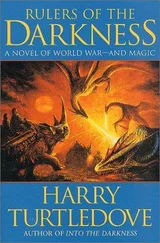The majordomo bowed when Hajjaj went inside. Tewfik had been a family retainer longer than Hajjaj had been alive; he was well up into his eighties, bent and wrinkled and slow, but with wits and tongue still unimpaired. “Everyone’s still going mad with celebrating, eh, lad?” he croaked.
He was the only man alive who called Hajjaj lad. “ Even so,” the foreign minister said. “We have won a victory, after all.”
Tewfik grunted. “It won’t last. Nothing ever lasts.” If anything refuted that, it was himself. He went on, “You’ll want to see the lady Kolthoum, then.” It was not a question. Tewfik did not need to make it a question. He knew his master.
And Hajjaj nodded. “Aye,” he said, and followed the majordomo. Kolthoum was his first wife, the only person in the world who knew him better than Tewfik. He’d wed Hassila twenty years later, to cement a clan tie. Lalla was a recent amusement. One day before too long, he’d have to decide whether she’d grown too expensive to be amusing any more.
For now, though, Kolthoum. She was embroidering with one of Hassila’s daughters when Tewfik led Hajjaj into the room. One look at her husband’s face and she told the girl, “Run along, Jamila. I’ll show you more about that stitch later. Right now, your father needs to talk with me. Tewfik—”
“I shall fetch refreshments directly, senior wife,” the majordomo said.
“Thank you, Tewfik.” Kolthoum had never been a great beauty, and had put on flesh as she aged. But men paid attention to her because of her voice, and also because she made it very plain that she paid attention to them. As soon as Tewfik shuffled away, she said, “It’s not as good as the crystal makes it sound, is it?”
“When is anything ever as good as the crystal makes it sound?” Hajjaj returned. His senior wife laughed. He went on, “You aren’t the only one who thinks it is, though, and you have friends in high places.” He told her about his conversation with King Shazli, and about what he’d had to do; when speaking with his wife, he did not need to wait through the ritual of tea and wine and cakes.
“A good thing he didn’t take you up on it!” Kolthoum said indignantly. “What would you do, underfoot here all day? And what would we do, with you underfoot here all day?”
Hajjaj laughed and kissed her on the cheek. “Powers above be praised that I have a wife who truly understands me.”
“Well, of course,” Kolthoum said.
Fernao had visited Yanina a couple of times before what news sheets in Setubal were calling the Derlavaian War broke out. Unless his memory had slipped, Patras, the capital, hadn’t been so frantic then. Yaninans were frantic—or, at least, they looked that way to foreigners—but they’d seemed less on edge then.
Of course, he thought, being a small kingdom sandwiched between Algarve and Unkerlant went a long way toward helping to make a folk frantic. Having King Penda of Forthweg cooped up somewhere in the royal palace couldn’t have helped matters, either, not with King Swemmel breathing down King Tsavellas’s neck to get his hands on Penda.
And so broadsheets sprouted on every wall. Fernao couldn’t read them; the Yaninans used a script all their own—as much to be difficult as for any other reason, as far as the Lagoan mage was concerned. But they were full of pictures of soldiers and dragons and red ink and the punctuation marks for excitement and urgency that a lot of scripts shared. If they didn’t mean something like LOOK OUT! WE’RE GOING TO BE IN A WAR!—if they didn’t mean something like that, Fernao understood nothing of symbols.
Two Yaninans were quarreling on the plank sidewalk in front of the doorway to the shop Fernao wanted to enter. They were going at it hammer and tongs, getting madder by the minute. In Fernao’s ears, Yaninan sounded like wine pouring out of a jug too fast, glug, glug, glug. He knew only a handful of phrases of it; it wasn’t a tongue closely related to any other.
A crowd gathered. Arguing and watching arguments seemed to be the Yaninan national sports. Men in tunics with puffy sleeves and tights and women with kerchiefs on their heads egged on the two combatants. At last, one of the skinny, swarthy men grabbed the other’s bushy side whiskers and yanked. With a shriek, the second man hit the first in the belly. They grabbed each other and rolled into the street, clawing and gouging and cursing. The crowd surged after them.
With a sigh of relief, Fernao slid through the now vacant doorway of the gourmet-foods shop. Varvakis supplied King Tsavellas with delicacies; selling him a shipment of smoked Lagoan trout gave Fernao an innocuous reason for coming to Yanina. The foodseller spoke fluent Algarvian, for which Fernao gave thanks. “Just another day,” the mage remarked, pointing to the commotion outside.
“Oh, indeed,” Varvakis answered. He was a short, bald man with a big black mustache and the hairiest ears Fernao had ever seen. Fernao’s irony went past him; as far as he was concerned, it was just another day. Patras was like that.
Fernao glanced around the shop. Varvakis did business with the whole world. Jars of Algarvian liver paste stood beside hams and sausages from Valmiera, Jelgavan wines next to Unkerlanter apricot brandy, Kuusaman lobsters and oysters by chewy strips of dried conch from Zuwayza, mild red peppers from Gyongyos alongside fiery ones out of tropic Siaulia. The mage pointed to some large brown dried leaves he didn’t recognize. “What are those?”
“I just got them in, as a matter of fact,” Varvakis answered. “They’re from one of the islands of the north, I forget which one. The natives crumble them in a pipe and smoke them like hashish. But they speed you up instead of slowing you down, if you know what I mean.”
“That might be interesting,” Fernao said. “But now—” Before he could get down to business, a plump woman with a distinct mustache walked in. Varvakis fawned on her. They walked over to a bin of prunes and had a long discussion of which Fernao followed not a word. The woman finally condescended to buy a few ounces’ worth. Varvakis gave her a couple of coppers in change with the air of a man conferring a kingdom-saving loan upon his sovereign. Fernao let out a muffled snort. Even more than Algarvians, Yaninans overacted.
“But now—” Varvakis said when the plump woman had left. Yaninans also had—and needed—a gift for picking up the threads of interrupted conversation. “But now, my friend, I have, or think I have, good news for you. A steward of my acquaintance tells me that—” He bowed himself double when a man came in and went over to examine the lobsters. At the prices he was charging for them, only a rich customer could have afforded any. Fernao quietly fumed till the transaction was done.
“A steward of your acquaintance tells you what?” the mage asked when Varvakis remembered he was there—he was learning to handle multiple interrupted conversations, too, although not to enjoy them. In some exasperation, he added, “ Could you let a clerk handle people till we’re done here?”
“Oh, very well.” The fancy grocer sounded testy. “But customers want to see me. They come to deal with me.” He puffed out his chest with pride—and with air, which he used to shout, “Gyzis!” The clerk emerged from the back room, wearing a leather apron over a Yaninan-style puffy-sleeved tunic. Grudgingly, Varvakis put him in charge of the front of the shop and took Fernao into the back room.
More delicacies lined the shelves there, some in jars, others kept fresh in rest crates. “About this steward—” Fernao prompted.
“Aye, aye, of course.” Varvakis’s eyes flashed. “Do you take me for a halfwit? For a price, he says, he can get you in to see King Penda—maybe Penda can moan that he’s pining for smoked trout. What you do once you see Penda, I know nothing about. I wish to know nothing about it.”
Читать дальше












